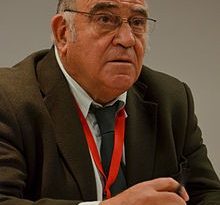Daniel Barenboim and BDS: The Edward W. Said London Lecture 2015
Daniel Barenboim, Künstlerischer Leiter und Generalmusikdirektor der Staatsoper Unter den Linden in Berlin, ruft auf der Edward W. Said London Lecture 2015 dazu auf, dass Musikunterricht in Schulen einen gleichwertigen Platz einnehmen sollte wie Literatur, Mathematik oder Biologie.
In der Fragen- und Antworten-Runde sprach Barenboim über seine eigene Entwicklung als Musiker, seine Haltung zum israelisch-palästinensischen Konflikt und der BDS Bewegung sowie zu den Erfolgen des West-Eastern Divan Orchestra.
Im folgenden Barenboims Antwort auf die Frage aus dem Publikum, ob er die BDS-Kampagne, die von weiten Teilen der palästinensischen Zivilgesellschaft im Juli 2005 gestartet wurde, unterstütze.
Source: London Review of Books online, May 29, 2015
Videos to the lecture
Edward W. Said London Lecture with Daniel Barenboim-Introduction
Edward W. Said London Lecture with Daniel Barenboim-Lecture
Edward W. Said London Lecture with Daniel Barenboim-Q&A
During the Q&A Daniel Barenboim was asked wether he supports the Boycott, Divestment and Sanctions (BDS) campaign, launched by a large majority of Palestinian civil society in 2005
Daniel Barenboim answered as follows ( in the Q&A video at 18:29′, starting with a question from the audience)
‘…I think the boycott movement BDS is absolutely correct, its perfectly right and necessary with one limitation, one criticism –that is that it refuses any contact with anything that has to do with Israel. In other words, there is not enough differentiation. I think there are enough people in Israel who think very different from the government. Artists and other people. Writers, certainly. Musicians, certainly. And by making a blind boycott, you deprive yourself of the possibility of making contact with people who disagree with you – a member of the boycott – as much as, equally about the policies of the government.
And let us not forget one thing: The Israelis and the Palestinians are blessed or cursed to live either together or side by side, but certainly not back-to-back. And therefore, a boycott that is completely generalised and has no feeling for nuances takes away the possibility of ever imagining a future that will be different from what it is now. And It only then encourages policies, as we have read in recent days from the foreign minister from Israel, where it is clear that the present government in Israel is not interested in a two-state solution, it is not interested in a one-state solution. It is interested in a Jewish, an exclusively Jewish solution for all the territories, and that is unacceptable.’
‘…It is very short-term and not positive for any future for the Palestinians to boycott anything that has anything to do with Israel. Everything to do with government policies, yes…‘
The first questioner refers to art’s practitionners in the UK who have said that they will not work with the Israeli State or its ambassadors because they feel that this is life-destroying – see also the pledge of Artists for Palestine UK
The second questioner mentions MachsomWatch and Emek Shaveh.
Here are the links to the website of the two organisations:
MachsomWatch (Women against the Occupation and for Human Rights)
Emek Shaveh (Archeology in the Shadow of the Conflict)


